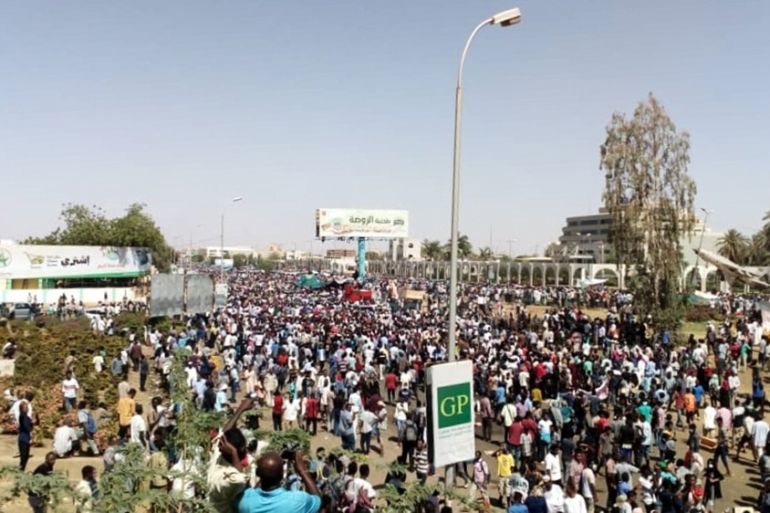Sudan security forces ‘fire tear gas’ at protesters in Khartoum
Witnesses say troops deployed around army headquarters as security forces try to break up sit-in protest.

Security forces in Sudan fired tear gas at protesters in an attempt to break up a demonstration in front of the defence ministry in central Khartoum, witnesses said on Monday.
A witness told Al Jazeera that security forces on pickup trucks fired the gas as they charged towards the protesters who have been calling for the resignation of President Omar al-Bashir amid deepening economic woes.
“After that, security forces began firing tear gas at protesters,” the witness said.
Other witnesses told AFP news agency that the army deployed troops around its headquarters in the capital and blocked several roads leading to the complex, where protesters have amassed since Saturday.
The tear gas fired on Monday morning was felt by residents in an upscale Khartoum district some five kilometres away from the army complex.
|
|
“I stepped out on my balcony hearing the sound of the gas canisters and could feel the gas in the air,” said one resident.
Thousands of people have rallied outside the headquarters of the Sudanese army in Khartoum since Saturday, urging the country’s military to back their demands for Bashir’s resignation.
Chanting “Sudan is rising, the army is rising,” crowds massed on Sunday outside the complex, which also houses Bashir’s official residence and the defence ministry.
The protest movement began as a reaction to a government decision to triple the price of bread in December, but it has since escalated into growing demands for Bashir’s departure after three decades in office.
Protest organisers chose April 6 to begin the rally outside the army headquarters to mark the 1985 uprising that toppled the administration of then-President Jaafar Nimeiri.
The military removed Nimeiri before handing power to an elected government, which in turn was overthrown by al-Bashir in a 1989 coup.
Bashir, meanwhile, has refused to step down, saying that his opponents need to seek power through the ballot box.
Since April 6, at least four people have been killed by security forces in Khartoum.
Another protester was killed at a separate demonstration in Omdurman, Sudan’s second most populous city.

While officials say 32 people have died since the protests erupted on December 19, Human Rights Watch has said at least 51 people have been killed during the demonstrations.
Hundreds of protesters, including opposition leaders, activists and journalists have also been jailed by the widely-feared National Intelligence and Security Service.
Critics accuse Bashir of mismanaging the economy, leading to soaring food prices and regular shortages of fuel.
Bashir has acknowledged that the economic concerns raised by protesters are “legitimate”, though he imposed emergency rule on February 22 after an initial crackdown failed to rein in the protests.
The Sudanese leader’s term ends in 2020 and he has repeatedly promised over the years not to make new runs for the presidency. Without amending the country’s constitution, he can not run for a third term.